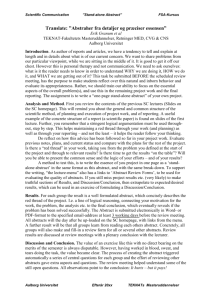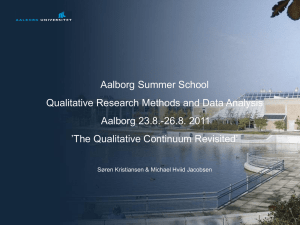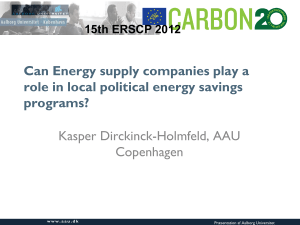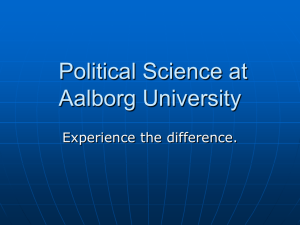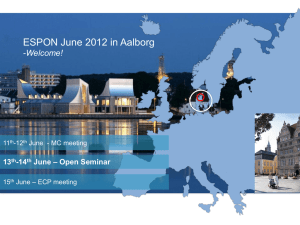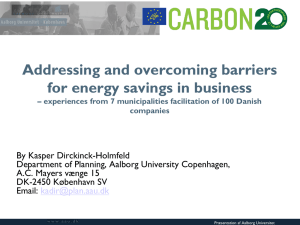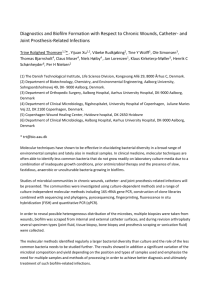Presentation GIN 2012
advertisement
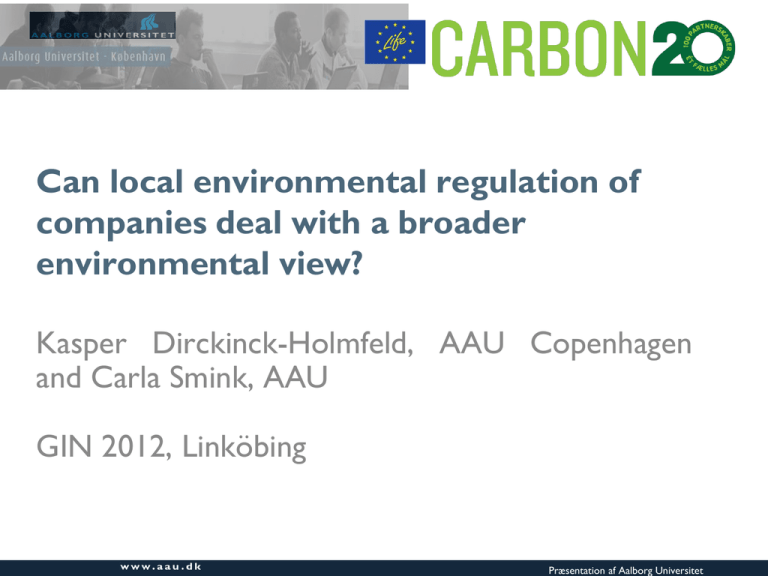
Can local environmental regulation of companies deal with a broader environmental view? Kasper Dirckinck-Holmfeld, AAU Copenhagen and Carla Smink, AAU GIN 2012, Linköbing Præsentation af Aalborg Universitet A broader environmental view • Traditional focus was on diluting or reducing emissions of plants in respect to the local environmental concerns • Increased focus on global environmental concerns such as Climate change, resource scarcity and suppliers pollution in third country by addressing input related aspect and whole lifecycle perspectives Præsentation af Aalborg Universitet New Modes of Governances • Critique of Command-and-Control regimes for being static and costly • Advocates for new regime based on participation, dialogue, devolved decisionmaking, flexibility, inclusiveness, consensusbuilding • Also in the environmental field Præsentation af Aalborg Universitet Ecological Modernisation - Converging of business and regulatory approaches towards environment? Companies approach towards Environment •Traditional see environment as external to core business with implementation of end-of-pipe as means to comply regulation and thus causing extra cost •Increasingly “some” companies are seeing environmental as providing competitive advantages • Directly in terms of resource efficiency gains (Eco-efficiency, Pollution prevention strategies etc) • Also as being more efficient in fulfilling environmental requirement • Include environment in strategic positioning and in product development Præsentation af Aalborg Universitet Ecological Modernisation – Converging of business and regulatory approaches towards environment? Change in Governance approach • From enforcing Norms based on carrying capacity of surroundings and/or End-of-pipe technologies • Towards promoting the use of BAT, Pollution Prevention and Cleaner Technologies through both norms and especial dialogue and focus on win-win sollutions Præsentation af Aalborg Universitet Remmen and Nielsen (1994) Characteristics 1. Inactive · · · “We have no problems” Environmental management is unnecessary No reactions to new environmental standards · Reactive · Pro-active · · · · · · · Interactive ”We obey the law” Environmental management should be addressed if necessary Compliance position driven by legislation ”We are ahead” Environmental management is a worthwhile function Willingness of senior management to use management systems and policies to encourage organisational change ”We define the agenda” Strive to be environmental leaders in their industries Environmental management is a priority item · · · Differentiated Approach towards Companies Not all Companies are alike Calls for differentiated regulatory approach! - approaching companies differently in terms of either regulator or facilitator - Regulatory relief for best performer by extended use of selfregulation Præsentation af Aalborg Universitet Agenda of this Paper • In Denmark several attempts to address a broader environmental perspective as part of the permitting and monitoring process was carried out during the late 1980s and 1990s though e.g. promotion of Cleaner Technologies and Environmental Management System • This paper looks at status for local governments capabilities to do so here 10-20 years after Pollution Prevention was included as prime principles in the Environmental Protection law • Specifically it addresses the local authorities perceptions of options to include GHG reductions and energy efficiency Præsentation af Aalborg Universitet Empirical data • Review of several political documents including both prime legal texts (acts and orders), political agreements and different evaluations reports • Conduction of interviews with case workers in 7 Danish municipalities participating in a EU funded project “Carbon 20” about how to engage local business in CO2 reductions, and • Interview with a employed in the central administration Danish Environmental Protection Agency Præsentation af Aalborg Universitet Findings • Define findings in respect to: 1. Legal base for addressing broader environmental concern as part of requirements in either permits or injunctions 2. Facilitation of companies to implement environmental improvement beyond compliance as part of Monitoring/surveillance activities Præsentation af Aalborg Universitet Legal base 1 • There (seems to be) legal base for addressing broader environmental concern including GHG reduction and energy. • Its even stated that there is actual an obligation to address at least waste prevention • However the Local authorities considered the legal base as unclear, if even existing! • They do therefore not formulating requirements Præsentation af Aalborg Universitet Legal Base II • Furthermore, the legal base is strictly related to formulation requirement based on BAT • A competence that are no longer necessarily present: • Several of those companies subject for full permits and full assessment of BAT, are under the jurisdiction of the state, • the majority of rest is subject for centrally defined requirement in relation to BAT with no options to add additional requirement related to BAT • These central requirement do (currently) only relates to traditional environmental concerns Præsentation af Aalborg Universitet Facilitation beyond compliance I • While the legal base for formulating requirements are weak, there is amble room to address broader environmental concern as a facilitation beyond compliance • The Guidance document for Monitoring/Surveillance calls for a catalytic role in prolongation of the authority role • Opposite, another guidance document calls for a prioritisation of monitoring activities toward the reactive, while providing those with establish self regulative procedure such as e.g. EMS a regulatory relief Præsentation af Aalborg Universitet Facilitation beyond compliance II • Furthermore, the catalytic role is solely perceived as an option, and not obligation, and thus depending on local political prioritising • In the Latest 10-15 years, the direct regulation of companies have experiences severe resource restrains and current economic crisis is putting further pressure on public finances in Denmark • Even caseworkers from municipalities belonging to a forum called “Green Cities” doubted that they can continue to be able to prioritise something that is not strictly required Præsentation af Aalborg Universitet Conclusions • Can local environmental regulation of companies deal with a broader environmental view? • In theory: Yes, as there is both amble legal room and established competences to at least address and facilitate a stronger focus on broader environmental concerns as part of dialog to go beyond compliance. • However, in practise, the direct regulation of companies is still dominated by a traditional authority role focused on the traditional environmental parameters • and possible even more now than in the 90’ties. Præsentation af Aalborg Universitet Perspectives • A renewed focus on climate and discussions about green growth might trigger a renewed focus on the need for addressing broader environmental concerns as well as reintroducing the more facilitative role. • Several municipalities are starting to carry out EU financed projects on this and are lobbying that Climate and energy is a matter to be addressed by municipalities • Furthermore different state agencies seems interested in reopen the discussions. • However, the public finances are still under pressure , which puts severe restraints on any new initiatives, including the continuing of the current EU projects. Præsentation af Aalborg Universitet
